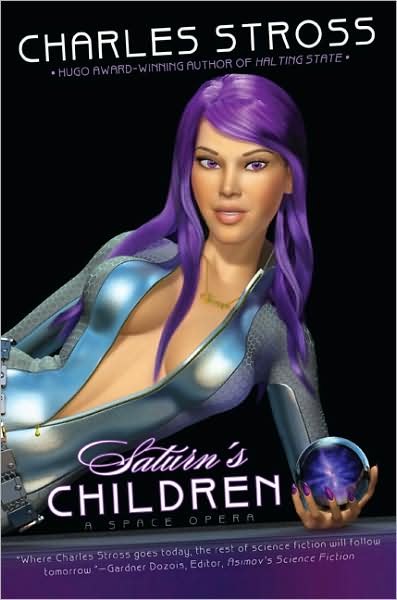Two reviews went up today, Richard Morgan’s The Steel Remains and Charles Stross’s S aturn’s Children. On one hand, you might say two very different books one is Sword & Sorcery/Epic Fantasy the other is Space Opera. On the other, over the course of the narrative in both novels, gender roles are examined and both books are quite graphic. Saturn’s Children published in July from Ace and The Steel Remains in August from Gollancz in the UK and will be publishing early 2009 from Del Rey. I realize I may be the last of my kind (online reviewer/blogger) to tackle The Steel Remains, but whatever.
aturn’s Children. On one hand, you might say two very different books one is Sword & Sorcery/Epic Fantasy the other is Space Opera. On the other, over the course of the narrative in both novels, gender roles are examined and both books are quite graphic. Saturn’s Children published in July from Ace and The Steel Remains in August from Gollancz in the UK and will be publishing early 2009 from Del Rey. I realize I may be the last of my kind (online reviewer/blogger) to tackle The Steel Remains, but whatever.
 aturn’s Children. On one hand, you might say two very different books one is Sword & Sorcery/Epic Fantasy the other is Space Opera. On the other, over the course of the narrative in both novels, gender roles are examined and both books are quite graphic. Saturn’s Children published in July from Ace and The Steel Remains in August from Gollancz in the UK and will be publishing early 2009 from Del Rey. I realize I may be the last of my kind (online reviewer/blogger) to tackle The Steel Remains, but whatever.
aturn’s Children. On one hand, you might say two very different books one is Sword & Sorcery/Epic Fantasy the other is Space Opera. On the other, over the course of the narrative in both novels, gender roles are examined and both books are quite graphic. Saturn’s Children published in July from Ace and The Steel Remains in August from Gollancz in the UK and will be publishing early 2009 from Del Rey. I realize I may be the last of my kind (online reviewer/blogger) to tackle The Steel Remains, but whatever. Here’s a snippet of my review of Saturn’s Children:
Here’s a snippet of my review of Saturn’s Children:Freya constantly references her One True Love bringing focus back onto what her, and all of her kind’s, purpose in the galaxy is. Stross characterizes her enough to make her seem human, until she ponders removing an arm and a leg in order to secure safe passage in the galaxy.
.
.
.
.
So, then, Stross provides ample rumination for identity in the future and how circumstances lead to identity. Freya’s jumbled identity isn’t the only one up for debate; she is blocked at several points along her journey and it’s rarely clear just who is employing her and who is trying to stop her. In many senses, this element of the novel lent a heist-like feel to the story.
 Here’s some from The Steel Remains:
Here’s some from The Steel Remains:Like many a fantasy novel, one of the main themes hanging over the heads of the characters is war. However, Morgan doesn’t focus on war itself as much as the specter of a past war and the threat of a potential war. In the protagonist Ringil Eskiath (Gil), Morgan captured an air of embittered veteran. Ringil is called home by his mother to search for his missing cousin Shering, rumored to have been sold into slavery. Ringil brings with him an enchanted sword, Ravensfriend, with the magical ability to can through anything. Unfortunately, Ringil’s father and people from his town are dead set against his quest to save his cousin. Adding fuel to the fire is the disdain Ringil’s father holds over his son; despite Ringil being an honored war veteran, dad still can’t look past Ringil’s homosexuality. Clearly, Ringil is a complex character who has quite a lot baggage, straddles many lines, and ultimately, comes across as rather genuine.
No comments:
Post a Comment